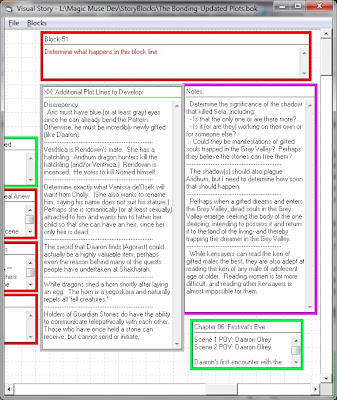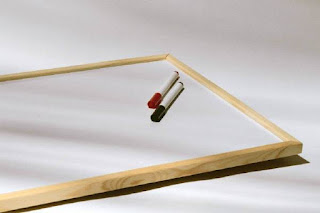 In my previous post (How a Geek Writes an Epic Fantasy part 1) I introduced you to Magic Muse, my writing workbench. But that's only a portion of my Epic Fantasy Writing tool set. I also wrote an additional program that I call Visual Story. (One day I'll merge the two into a single application.) It has a number of uses, but I use it (loosely) as a storyboard or outline interface.
In my previous post (How a Geek Writes an Epic Fantasy part 1) I introduced you to Magic Muse, my writing workbench. But that's only a portion of my Epic Fantasy Writing tool set. I also wrote an additional program that I call Visual Story. (One day I'll merge the two into a single application.) It has a number of uses, but I use it (loosely) as a storyboard or outline interface.Essentially, the application consists of textboxes that can be sized and arranged on a large backdrop. Each box contains one section for a title or heading and a second section for content. Colors can be applied to each box's borders, titles and content. I prefer setting the border colors according to plots.
 I tend to wrap a complete chapter into a single box. I list a description of the chapter's scene(s) and indicate which character's viewpoint is being used for each scene. This works well for documenting chapters already written. For planning, well, let's just say that this is about as close to true outlining as I get.
I tend to wrap a complete chapter into a single box. I list a description of the chapter's scene(s) and indicate which character's viewpoint is being used for each scene. This works well for documenting chapters already written. For planning, well, let's just say that this is about as close to true outlining as I get.I've written a number of other applications over the years. One served as virtual index cards that I intended to use for character bios, description of places and things, etc., but I've found that my scribblet in Magic Muse serves that purpose well enough for me.
But as much as I love my electronic tools, I don't rely exclusively on them.
Whiteboard
 I have a whiteboard
beside my desk at all times. I've been known to draw on the
whiteboard. I sketched out the Hosiyin Citadel from my first book on
it. There were characteristics I knew I wanted, but I needed my eyes to
see it so I could see it through a character's eyes.
I have a whiteboard
beside my desk at all times. I've been known to draw on the
whiteboard. I sketched out the Hosiyin Citadel from my first book on
it. There were characteristics I knew I wanted, but I needed my eyes to
see it so I could see it through a character's eyes.I use the fine-tipped dry-erase markers so I can scribble loads of legible text. I'll occasionally jot down the names of characters that need addressing in the story and how soon. I'll work out plot mechanics for finding logical reasons for Character A to be in Location B so that Event C transpires according to plan. I may write about dragons and magic, but even they must adhere to some form of logic.
Journal
 When it comes down to fleshing out my world's settings, background, history and other such trivia that makes it into the manuscript only by--at best--a passing reference. Journals and diaries are great places for me to discover my world's history, back story.
When it comes down to fleshing out my world's settings, background, history and other such trivia that makes it into the manuscript only by--at best--a passing reference. Journals and diaries are great places for me to discover my world's history, back story.I used this method for working out details of the last major war in my book, exploring treaty details, discovering the origins of races, even for writing short stories that serve no purpose other than enabling me to flesh out characters before they make it into the book.
The actual manuscript
I sometimes type quick notes, reminders, potential dialog or possible narrative snippets right inside the manuscript itself, usually at the end of the scene or chapter. I do this when the snippet must be addressed or incorporated before moving too far into the next scene or chapter.
I've tinkered with index cards, college or narrow ruled spiral-bound notebooks, even loose leaf paper, but I really prefer a searchable, organized electronic means to store notes. And of course, I now have my Android tablet. It's great for proofing what I've written. The format and display is just different enough that I'll spot mistakes that I've overlooked a hundred times on the computer monitor.
What tools do you use?
A whiteboard can be a fantastic writing tool. The bigger, the better. I use mine to write out passing thoughts, make lists, and to draw out the placement of characters in scenes to help with my descriptions, among other things. Good post!
ReplyDeleteYes, I do love my whiteboard. They are so handy and have so many possible uses. I'd make one entire wall of my office a whiteboard if I could get away with it. I might even leave a small section of it near the floor for the grandkids to write on...maybe.
DeleteI am just reading this and your last "geeky" post. I'm unsure if this would work for me since I just found out what a "Pantser" is and that I am one. On the other hand this stuff of yours looks really cool. Can you draw geographical map with it? Epic fantasy is my thing too and the map was the only thing I had to write down physically. Maybe this will turn into something big for you and you will get "knighted" for it!
ReplyDeleteAlas, no. It doesn't support the actual drawing, only pasting in of images drawn elsewhere. (For me, that's usually MS Paint.) I'm really more of a pantser myself, discovering most of the story's details as I go, but even so, the tools do come in handy. Sir Jeff. That has a nice ring to it, eh? :)
DeleteI use very basic tools. I have two notebooks (although most of the information in one is defunct now) that I use for notes on my novel. I am also developing a basic Word outline. For other projects I have a separate Word document for notes/outlines, keep everything in my head or make everything up on the spot (I'm more of a discovery writer), or keep notes, summaries, or outlines at the end of the same document.
ReplyDeleteIt's amazing how much of my notes became obsolete the further into my story I got. I recently pulled up some really old notes and drafts of the book I just finished. Aside from a few underlying themes and major events, it's almost a completely different story.
DeleteFor some reason though, I just can't get myself to use Word for outlines. I don't know why. It's very good for just that sort of thing.
These are some impressive tools. I'm still just a "gardener" planting a seed, watching it grow, weeding and transplanting. I would love to be more organized, though. You are an inspiration.
ReplyDeleteWhy thank you! Interesting metaphor there. I guess most of our stories of any length do tend to "grow" over time. I hope my thumb is green enough to keep them alive. ;-)
DeleteYou have an android tablet? Go you, I have one too. And wow you have so e good tools. I think I'll go geek in my writing so I can play with all this cool stuff. I have a word document, and a battered notebook under my pillow (really battered, since be of my cats tried to eat it)
ReplyDeleteYes, my daughter and her husband gave me one as a birthday present. It's my own, my precious. The biggest drawback of having a tablet is that I download books faster than I can read them. I've always preferred the feel of paper under my fingers while reading, but there's nothing like being able to carry a hundred books without the bulk and weight.
DeleteChanges, pictures and maps with ideas are liberally scattered with post-it notes that can be moved and jostled until I’m happy. Would love this to happen on a white board but I share my writing space with my husbands office, he earns more money than me so gets more space. Then I add them to my chapter’s skeleton and characters relationship tree. The rearranging and the ease of writing the post-it notes often acts like a springboard with my writing.
ReplyDeletePost-it notes, eh? Fascinating. That sounds like it could open countless possibilities. I may have to give that a try. As for the whiteboard, no need to limit yourself to the so large it's got to be mounted variety. I prefer one that I can place on my lap and set aside with ease. It stacks all nice and neat between the desk and waste basket (leaving room for more whiteboard friends to come and visit!) Surely hubby wouldn't object to that? ;)
DeleteThanks for stopping by!
I use a spiral notebook for the outline, index cards for jotted ideas and MS Word to write the manuscript. Mostly it's getting the story in my thoughts into a text form.
ReplyDeleteWhen I need to search, I use the find tool in the document using key words or phrases. It's especially handy when working on a sequel. There may be more efficient methods, but spending more time organizing only seems to distract me from completing the project.
Not very fancy but it works for me. I think every writer has to explore and utilize the tools that work best for him/her.
Another new face to greet! Welcome!
DeleteFancy is never a good measure of worth. Priceless are the methods that work and yield benefit, be they post-it notes or custom-written software.
I think you may be on to something there about distraction. It probably comes down to the way our minds work and on what things we focus. If organizing notes becomes the primary task at hand then Miss Muse wanders off to places not nearby.
The opposite for me is true though. When I need to reference something that I can't find, it drives me nuts, so for me, the organization is an "ounce of prevention" as much as anything.
I have three plain white note-books on the go at the moment, and tend to write things down as they come into my head!
ReplyDeleteI have an award for you at my site! ;)
Notebooks... Sometimes the simplest approach is the most elegant.
DeleteThanks for the award, Megan! I'd like to thank my mom, my wife...wait, I should probably save the acceptance speech for the post. ;-)
I love the way your mind works. I need to get more organized. I tend to write notes on anything and everything I can get my hands on. I end up with a jumbled mess that eventually evolves into an outline. Once, I even used the huge white board at work and got the production guys brainstorming with me.
ReplyDeleteI just love it when my mind works at all! LOL
DeleteI've learned that for me, scribbling on any nearby scrap of paper is risky. I have a tendency to misplace the chicken scratches afterwards if I'm not careful. I'm usually cool if I can stuff it in my wallet or pocket.
I bet the brainstorming session at work was fun!
Jeff, just take the three awards...but link them back to my blog!
ReplyDeleteThe plain note-books that I use are all recycled, hand-made books. One is vintage cloth covered and is probably my favourite for sketching in. If I use pastels, a good way of them not smudging is to spray them with hair-spray.
Thanks, and shall do.
DeleteHair spray, huh? Never thought about that. I've dabbled with oils and watercolors, but not much else. I love painting providing no one sees the end result. My painting is only marginally better than my singing. :)
WOW!
ReplyDeleteI just use spiral notepads to write down the basics, the characters, the plot, the outline, etc. And then I just type it all up in Word. Who knew there were so many different options out there. :)
great post!!!!!
Thanks! You gotta watch out for these creative types. You never know what they'll think up next. It's fascinating learning how different people approach the same task from radically different approaches--oftentimes with comparable results. It's also interesting hearing what they think of their approaches as well.
Delete